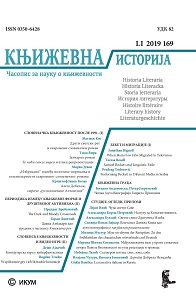Међукњижевне везе у прози словачког аутора Павела Виликовског из угла рецепције и превода
Interliterary Relations in the Reception and Translation of Pavel Vilikovsky’s Prose
Author(s): Marina SIMAK SPEVAKOVASubject(s): Comparative Study of Literature, Serbian Literature, Slovak Literature
Published by: Институт за књижевност и уметност
Keywords: reception;Slovak prose;Pavel Vilikovski;postmodernism;irony;intertextuality;literary translation;
Summary/Abstract: Two main research strains have been noted in the reception of Pavel Vilikovsky’s work. The first one is centered around the thematic-stylistic and narratological aspects of postmodernism. The second strain, which appeared in the mid-1990s, focuses on the function of language deconstruction, widely observed both in the structure and the semantics of Pavel Vilikovky’s works and observed especially in their reception in a foreign literary context. The reception of intertextuality in the Slovak literary context has contributed to viewing Vilikovsky’s prose as a special type of an “autobiographical memory“ (Peter Zajec). The translations of Vilikovsky’s works into various foreign languages play an important role in developing new intertextual relations. The Serbian translations of the intertext in the novella Koň na poschodí, slepec vo Vrábľoch, the novel Posledný kôň Pompejí and the collections of short stories entitled Krutý strojvodca and Čarovný papagáj a iné gýče reveal new metatextual processes in translation and illustrate how the new intertextuality redraws the boundaries of the metatextuality of translation. The intertexts in the Serbian translations of Vilikovsky’s works have contributed to establishing a new metatextual connection between the Slovak and Serbian works of literature, clearly exemplified by the lines from three Serbian poems about a Slovak smith, which appear in the translation of the novel Posledný kôň Pompejí.
Journal: Књижевна историја
- Issue Year: 51/2019
- Issue No: 169
- Page Range: 351-363
- Page Count: 13
- Language: Serbian

